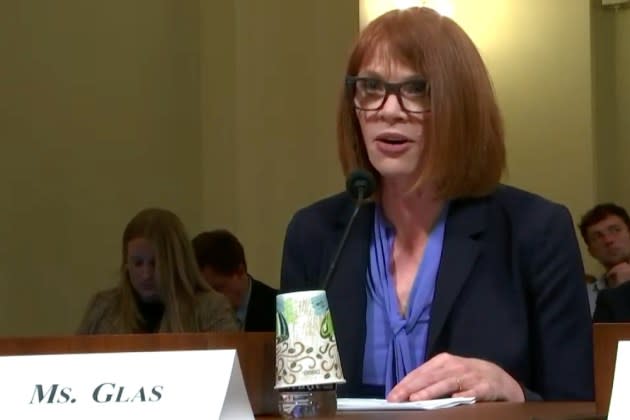‘This is an Economic Fire, a Health Fire, and Human Rights Fire,’ NCTO Testifies on De Minimis Loophole

America’s top textile group urged Congress to address the controversial de minimis loophole that’s enabling a “superhighway” of forced-labor goods into the U.S. market.
Kim Glas, president and CEO of the National Council of Textile Organizations (NCTO), took aim at cotton linked to Xinjiang, the Chinese region tainted by allegations and evidence of forced-labor abuses against Uyghur and other ethnic minorities.
More from Sourcing Journal
Stronger Enforcement Is Key to US Textile and Apparel Industry's Long-Term Survival
Lawmakers Criticize NBA's 'Extremely Disappointing' Forced Labor Response
Legislators Urge Biden to Address China's 'Aggressive and Illegal' Trade Practices
About 72 percent of cotton products made in China contain raw material from Xinjiang, which has led to compromised textiles and clothing “leaking into supply chains in the U.S.,” along with other free-trade agreement (FTA) regions like Central America, Glas testified Thursday at a congressional hearing on “Exploitation and Enforcement: Evaluating the Department of Homeland Security’s Efforts to Counter Uyghur Forced Labor.”
Since the Uyghur Forced Labor Prevention Act (UFLPA) became law, Xinjiang cotton production has increased. Because China is a major purchaser of U.S.-grown cotton, “it is commonplace for fibers, yarns, and fabrics from various countries of origin to be indiscriminately mixed at all stages of the production process, concealing and diluting the source and proportion of forced labor inputs found in a final garment,” Glas said.
This means offenders can get tainted goods into the U.S. market and harm compliant businesses in the process, she added. “American textile plants have been forced to idle equipment and lay off workers, while some companies have been put out of business entirely,” Glas said.
“Not only are we failing to stop forced labor trade that Congress explicitly acted to address through the [UFLPA], but we are rewarding China with duty-free access under the de minimis provision of our trade law,” Glas continued. Under the rule, foreign shipments valued at $800 or less enter the country duty free. “The de minimis loophole has become a superhighway for illicit goods as a result of ineffective rulemaking and a lack of adequate congressional action and it’s a threat to us all,” she added.
Most of the nearly 3 million de minimis shipments that enter the U.S. daily, aren’t inspected because they’re “deemed to represent an amount of trade that is too minimal for CBP to review or collect any tariffs on, including China 301 penalties,” Glas said.
“The U.S. received more than 1 billion individual packages claiming de minimis preferences in FY 2023, an increase of nearly 700 percent from the 150 million packages that entered via de minimis in 2016,” she told Congress. “This is no longer ‘minimal trade,’ and de minimis should be renamed ‘de maximus’ trade given the overwhelming volume.” De minimis growth is a “direct consequence” of “faulty CBP rulings that have allowed mass distributors, such as Shein, Temu, Amazon, and others, to facilitate millions of direct duty-free, and virtually uninspected de minimis shipments each day,” Glas said.
In her testimony, Glas said Congressional lawmakers should demand greater oversight into CBP‘s enforcement of the UFLPA and require Customs officials to testify regularly about their efforts. “CBP’s inability to conduct adequate enforcement has real consequences here in the U.S.—with communities devastated by manufacturing facilities closing—and throughout this hemisphere where apparel production is a top employment sector,” she said.
If current enforcement trends continue, Glas estimated that 2 million textile jobs in the Western Hemisphere would be put at risk. She believes customs officials should be required to detail a “robust, forward-leaning enforcement plan” to discourage non-compliant trade, including increasing penalties and deterrents.
Meanwhile, Congress must act to close the de minimis loophole, Glas added. This would help limit access for exporters selling counterfeits and goods made with forced labor. “This trade is uncontrollable and impossible to monitor; it makes enforcement of UFLPA impossible,” she said.
To enhance anti-forced-labor legislation, the administration should expand the Entity List—which currently includes 27 names, all operating in China—of known offenders, including persons, enterprises and governments, Glas added. The list should include more companies outside of the country that may be trading in goods and inputs made with forced labor, she said.
“This is an economic fire, a health fire, and human rights fire—and we need it extinguished immediately,” Glas said after thanking Subcommittee Chairman Dan Bishop (R-N.C.) and Ranking Member Glenn Ivey (D-Md.) for holding the hearing.
“An aggressive enforcement plan, coupled with a set of rational revisions to the outdated and now extremely dangerous de minimis loophole in our trade law would prevent the continuation of this devastation, but Congress and the Executive Branch must decisively act now,” she said.

